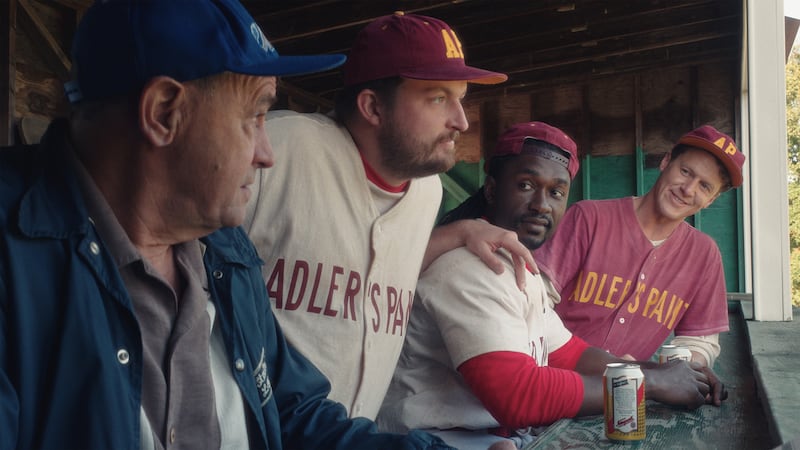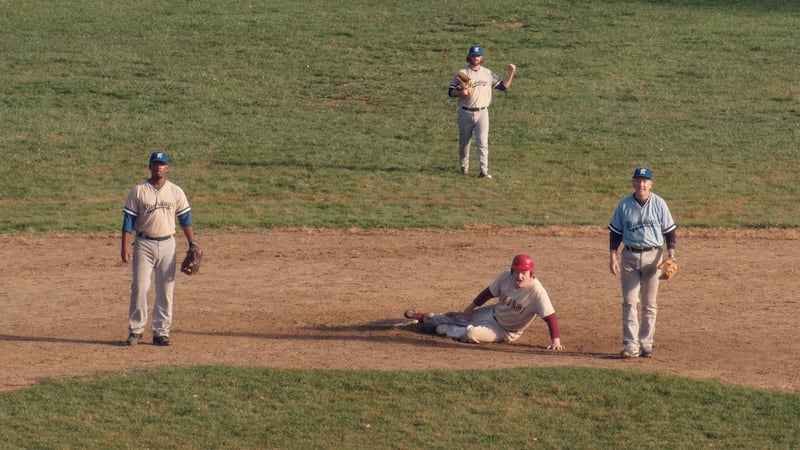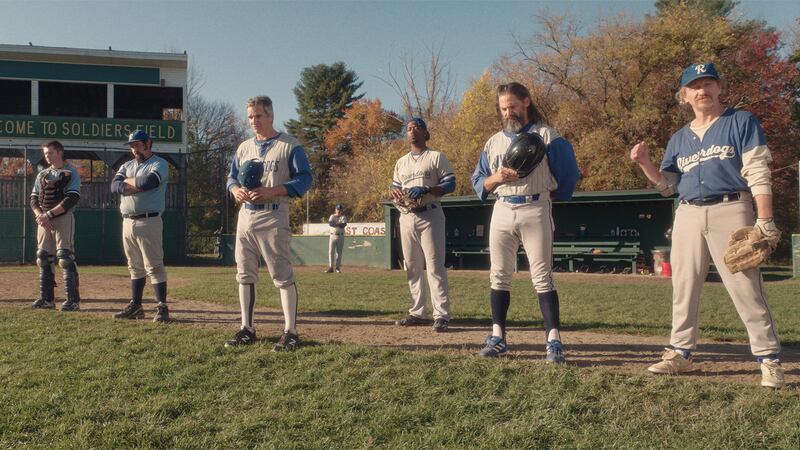Eephus is named after a type of curveball that’s so unnaturally slow, it confuses the batter, who waits and waits for it to arrive before, poof, it’s past them.
In that regard, it’s a lot like baseball, and Christmas Eve in Miller’s Point cinematographer Carson Lund’s feature directorial debut expands that idea to suggest that it’s also similar to life itself, especially for the ragamuffin men who regularly gather at Soldier’s Field to participate in an adult recreational baseball league that’s nearing its end.
A standout at last year’s Cannes and New York film festivals, this wonderfully funny and melancholy sports movie is attuned to the passage of time, the inexorable regret that comes with it, and the understated beauty of a crisp fall 1990s day in New England in the company of likeminded souls who shoot the breeze, down a few beers, and talk trash while chasing faded glory. Modest and moving, it’s a new sports-movie classic, as sneakily effective as the pitch which gives it its title.
Set to the sounds of birds and crickets, the crack of a bat and the cheers of teammates, and the amusing ads for local businesses that play on the dugout’s boombox, Eephus, in theaters March 7, wholly situates itself at Soldier’s Field, a non-descript diamond with some raggedy stands, a rickety and rarely used press box, and an outfield wall that separates it from a distant soccer pitch being used by a few random kids.

Here, the Riverdogs are set to square off against Adler’s Paint in what will be the final game in the teams’ rec league, at least on this patch of dirt, as a middle school is about to be erected where their field stands. This inevitability gives their contest a hushed funereal air, although the players themselves—guys who, whether in their twenties or sixties, have entered a new past-their-prime phase—already seem to be ghosts of their former selves.
The de facto master of ceremonies tasked with keeping score and, ultimately, calling balls and strikes (once the official umpires bolt), Franny (Cliff Blake) is the first to arrive, taking his usual position at the folding desk he carries to the field under his arm. The rest soon show up in shabby vehicles (a weathered yellow muscle car, a Chevy Camaro Iroc-Z), toting their gear and jawing lackadaisically with each other.
The Adler’s Paint squad is led by Ed (Keith William Richards) and the Riverdogs by Graham (Stephen Radochia), the latter of whom is involved in the plan to demolish Soldier’s Field and, thus, is treated with more than a bit of simmering disdain, especially from teammate Rich (Ray Hryb), whose long beard is starting to gray. As with the commercials that serve as the soundtrack to their swan song, these disparate men are homegrown, rough-around-the-edges, and a little bit silly and sorrowful.
Reminiscent of the works of Robert Altman and Bill and Turner Ross’ Bloody Nose, Empty Pockets, Eephus has a great, loving feel for its ramshackle setting and those who inhabit it. Taking place, fittingly, in mid-October as Halloween approaches and the autumnal leaves turn a vibrant red and orange, Lund’s film only occasionally depicts actual in-game action, much of it clumsy and oafish, with slow baserunners sliding awkwardly into the bag and bored outfielders keeping themselves awake by singing tunes under their breath.

Spitting sunflower seeds, chugging cans of beer, and chatting about the fireworks that John (John R. Smith Jnr) plans to set off afterwards as a ceremonial farewell are the order of the day, as is razzing opponents, the funniest instance of which is the entire Riverdogs team yelling out Italian foods (“Portabella mushrooms!” “Meatballs!”) to harass a grumpy batter.
Legendary documentarian Frederick Wiseman lends his voice as a radio announcer and 1970s Red Sox pitcher Bill “Spaceman” Lee wanders over to throw a few strikes, but Eephus is a decidedly un-glitzy affair, carried out by individuals whose paunches are more considerable than their talent.
Working from a script co-written with Michael Basta and Nate Fisher, Lund has affection for this highly particular milieu and a deep familiarity with its off-the-cuff rhythms—the way men joke, bicker, and insult, as well as shuffle about, groan, and cajole. A pair of slacker teenagers, an elderly regular, and player Bill’s (Russell J. Gannon) adolescent son and daughter comprise the crowd, cracking wise about the game’s shoddiness, and a pizza truck owner grouses about having ever gotten into his lousy business.

Meanwhile, players take line drives to the chest, fail to locate pop-ups, and throw out opponents at home, exhibiting non-professional skills and varying levels of energy and enthusiasm, with some eager to keep the game going into night and others ready to pack up and leave, no matter that this is the end of an era.
A lament for this specific league’s conclusion and, by extension, baseball itself, whose status as the national pastime is presently waning, Eephus is a good-natured celebration of small-town New England knuckleheads bonded by a dream.
Slugger Preston (Jeff Saint Dic) explains that, just as he sometimes sits on his deck in the cold and keeps himself warm by thinking he’s hot, he succeeds at the plate by pre-visualizing his victory (“Mind over matter”). That sort of imaginative mental trickery is not unlike what all these ballplayers are doing, envisioning themselves as still young, strong, and spry. Yet Lund’s film adores them for the fact that they’re not and they know it, and recognizes that they’re strengthened by the camaraderie fostered by their shared activity.

Split into chapters announced by Franny’s hand-marked scorecards and quotes from MLB greats, it’s at once vibrant and relaxed, funny and wistful, and animated by characterizations—and performances—that capture the feeling of grasping at something that’s destined to slip through one’s fingers.
Eephus’ players are running low on everything: motivation, balls, light, sobriety, and time. Nonetheless, Lund’s film melds its mournfulness with mouthy humor and evocative moodiness, with cutaways to puffy clouds in the sky and images of men’s cold breath in the dark night (illuminated by car headlights) contributing to the material’s pitch-perfect atmosphere.
Sad and sweet, it treats its subject without fanfare, right up to a finale that’s encased in darkness and a subsequent fireworks show that takes place off-screen. No matter its understatement, though, it’s a charmingly poignant portrait of the expiration of a unique and cherished world, and the nonchalant, angry, and anguished means by which it’s faced. For these aging athletes, it may be a last hurrah, but for Lund, it’s the start of what appears to be an immensely promising future.









